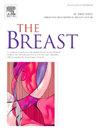sacituzumab govitecan在乳腺癌患者中的安全性:一项系统回顾和荟萃分析
IF 7.9
2区 医学
Q1 OBSTETRICS & GYNECOLOGY
引用次数: 0
摘要
sacituzumab Govitecan (SG)是一种一流的抗滋养细胞表面抗原-2定向抗体-药物偶联物(ADC),已显示出对乳腺癌(BC)患者预后有临床意义的改善。然而,它也伴随着显著的毒性。因此,我们进行了系统回顾和荟萃分析,以评估SG在该患者群体中的安全性和耐受性。方法全面检索PubMed、Embase和Cochrane数据库,以及ASCO和ESMO网站,检索评估SG在BC患者安全性的临床试验(ct)。所有分析均在R软件(v.4.2.2)中使用随机效应模型进行。异质性采用I2检验。结果纳入了7项研究——3项随机临床试验(rct)和4项单臂I/II期试验,包括928例接受SG治疗的患者和576例接受医生选择治疗(TPC)的患者。大多数患者患有三阴性BC (54.4%, n = 505),转移性疾病(89.8%,n = 833),并且进行了大量预处理(至少两线既往治疗)。最常见的全级别不良事件(ae)是:中性粒细胞减少(70%,95% CI, 64 - 76%),其次是恶心(62%,95% CI, 55 - 68%),腹泻(54%,95% CI 47 - 60%)和贫血(51%,95% CI, 38 - 65%)。对于高级别不良事件,46%的患者发生≥3级中性粒细胞减少症。与TPC相比,我们观察到中性粒细胞减少的风险更高(OR 3.11, 95% CI 1.62-5.99, I2 = 81%;p & lt;0.001),腹泻(或6.82,95%可信区间3.99 - -11.66,I2 = 64%;p & lt;0.001)和贫血(OR 2.26, 95% CI 1.20-4.27, I2 = 78%;p = 0.012)。分别有22%和4%的患者报告减少剂量和停止治疗,并记录了19例死亡(2%)。其中大多数被认为与治疗无关。本系统综述和荟萃分析为BC患者临床试验中SG毒性的安全性和管理提供了广泛的数据。报道了中性粒细胞减少症、恶心、腹泻和贫血的发生率。我们强调需要制定方案,建立预防措施和策略,以减轻sg相关的毒性。本文章由计算机程序翻译,如有差异,请以英文原文为准。
Safety profile of sacituzumab govitecan in patients with breast cancer: A systematic review and meta-analysis
Background
Sacituzumab Govitecan (SG), a first-in-class anti-trophoblast cell surface antigen-2-directed antibody-drug conjugate (ADC), has shown clinically meaningful improvement in outcomes of patients with breast cancer (BC). However, it has also been accompanied by significant toxicity. Thus, we conducted a systematic review and meta-analysis to evaluate the safety and tolerability of SG in this patient population.
Methods
We comprehensively searched PubMed, Embase, and Cochrane databases, and ASCO and ESMO websites for clinical trials (CTs) assessing the safety of SG in BC patients. All analyses were performed in R software (v.4.2.2) using random effects models. Heterogeneity was assessed using I2 test.
Results
Seven studies – three randomized clinical trials (RCTs) and four single-arm phase I/II – were included, comprising 928 patients receiving SG and 576 on treatment of physician's choice (TPC). Most patients had triple negative BC (54.4 %, n = 505), metastatic disease (89.8 %, n = 833), and were heavily pretreated (at least two lines of prior therapy). Most common all-grade adverse events (AEs) were: neutropenia (70 %, 95 % CI, 64–76 %), followed by nausea (62 %, 95 % CI, 55–68 %), diarrhea (54 %, 95 % CI 47–60 %) and anemia (51 %, 95 % CI, 38–65 %). Regarding high-grade AEs, 46 % of patients developed grade ≥3 neutropenia. Compared to TPC, we observed a higher risk of neutropenia (OR 3.11, 95 % CI 1.62–5.99, I2 = 81 %; p < 0.001), diarrhea (OR 6.82, 95 % CI 3.99–11.66, I2 = 64 %; p < 0.001) and anemia (OR 2.26, 95 % CI 1.20–4.27, I2 = 78 %; p = 0.012) for those on SG. Dose reductions and treatment discontinuation were reported in 22 % and 4 % of patients, respectively, and 19 deaths (2 %) were documented. Most of them were not deemed to be treated-related.
Conclusion
This systematic review and meta-analysis provides extensive data on the safety and management of SG toxicity in BC patients across clinical trials. Concerning rates of neutropenia, nausea diarrhea, and anemia were reported. We highlight the need for protocols establishing prophylactic measures and strategies to mitigate SG-related toxicity.
求助全文
通过发布文献求助,成功后即可免费获取论文全文。
去求助
来源期刊

Breast
医学-妇产科学
CiteScore
8.70
自引率
2.60%
发文量
165
审稿时长
59 days
期刊介绍:
The Breast is an international, multidisciplinary journal for researchers and clinicians, which focuses on translational and clinical research for the advancement of breast cancer prevention, diagnosis and treatment of all stages.
 求助内容:
求助内容: 应助结果提醒方式:
应助结果提醒方式:


